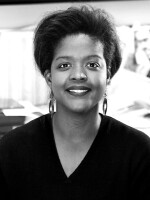STEVE INSKEEP, host:
A cease-fire is still in effect in eastern Congo, though it's fragile. And a U.N. aid convoy is trying to take advantage of that. The convoy is headed for rebel-held areas today, and it is carrying medical supplies for some of the quarter million people who fled the fighting. NPR's Gwen Thompkins has just returned from a meeting with the rebel leader who is at the center of this conflict. She joins us from the city of Goma. Gwen, welcome to the program once again.
GWEN THOMPKINS: Hello, Steve.
INSKEEP: So, where did you meet this man? What does he look like?
THOMPKINS: Well, I met him in a place called Kachanga, which is a very small rural town about 60 miles from Goma. He is a very tall, very thin, sort of willowy and elegant-looking man. He was wearing the nicest pair of camouflage fatigues that I've seen in quite some time and a very jaunty green beret.
INSKEEP: If you got to meet the general, I assume you got to see some portion of his army, his forces. What do they look like?
THOMPKINS: Well, the soldiers looked pretty well-outfitted, to be honest with you. I mean, their fatigues weren't as nice as his, but they were pretty nice, much nicer than any of the accoutrements that the Congolese army is relying on. They looked refreshed. They looked confident. And they also looked as if they felt some sense of momentum in what has been, for them, a month-long objective to reach Goma and to force the Congolese government to the bargaining table.
INSKEEP: We're talking with NPR's Gwen Thompkins who's just back from a meeting with rebel leader Laurent Nkunda in eastern Congo. What does he want?
THOMPKINS: Well, General Nkunda says that his story hasn't changed very much over the past several months. What he says he wants is that he wants security in this region, meaning he wants a reformation of the Congolese army. And he believes that the Congolese army has been infiltrated by extremist Hutus coming from Rwanda who were involved in the 1994 Rwandan genocide in which so many ethnic Tutsis and moderate Hutus died.
INSKEEP: Given that he does have this military force, is General Nkunda the master of the situation, Gwen Thompkins?
THOMPKINS: No, he's not the master of the situation. I mean, he appears to be, certainly because he's got the military might. But the truth is, his fate is not in his own hands. I mean, his fate will likely be determined by negotiations when they take place. And so far he's not been invited to participate in those negotiations.
INSKEEP: Gwen, granting that you've seen this military force that feels it's being successful right now that seems very well-equipped, does the general seem to accept any responsibility for the fact that hundreds of thousands of his countrymen are not well-equipped? In fact, they've become displaced. They're fleeing the violence. They need to be fed and clothed.
THOMPKINS: That's an excellent question, Steve. I mean, the civilians of this area of Congo are on their knees. I mean, these people, irrespective of the latest push that put 250,000 people on the road, I mean, these people have been so dehumanized and their energy sapped by years and years of conflict. And Mr. Nkunda, irrespective of his goals, has added to their pain by pushing forward with his military advance.
Many of these people are hungry. They're on the roads not knowing which way and which direction to go, whether to go back to their villages or to go someplace else where they think they can find food. Many of them have been separated from their families. Parents separated from their children. They know not where to go. And many of them are awaiting humanitarian rescue from aid organizations, international aid organizations. Nkunda yesterday acknowledged their pain. He's called many of these people his friends. But then he said that their suffering is the cost of freedom.
INSKEEP: NPR's Gwen Thompkins is in Goma in eastern Congo. Thanks very much.
THOMPKINS: Thank you, Steve. Transcript provided by NPR, Copyright NPR.







